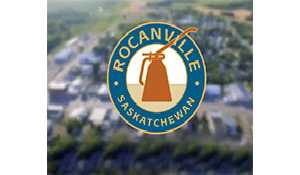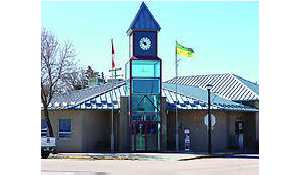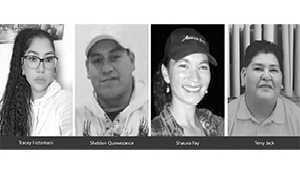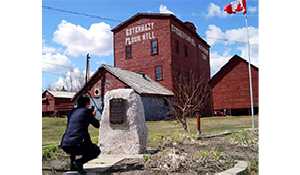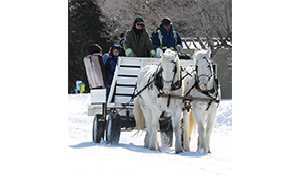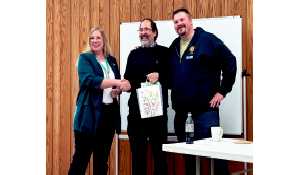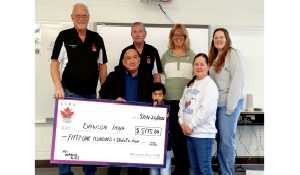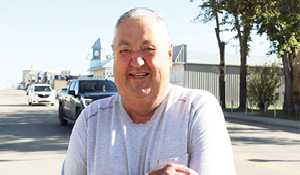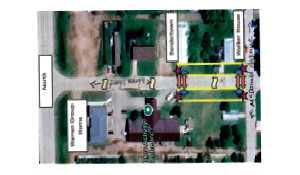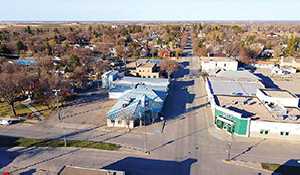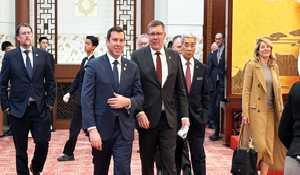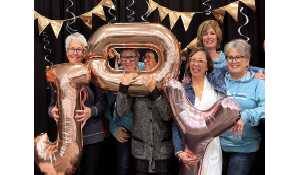Chance to stay in Canada perfect Christmas gift
December 18, 2018, 3:09 am
Kevin Weedmark
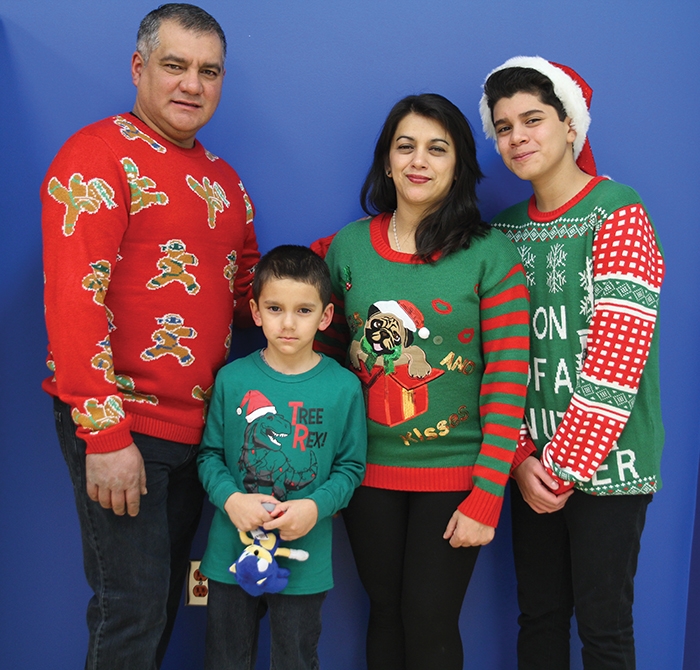

Eighteen months after they were facing a deportation order and the community rallied behind them in a vocal call to “Let Them Stay,” the Santos family of Moosomin received what they say is the best Christmas gift they could imagine—news that the first part of their application to stay in Canada on Humanitarian and Compassionate Grounds has been accepted, and now they must simply meet statutory requirements to receive their permanent residency in Canada.
“It was a good time to receive this letter,” says Victor. “It was the best gift ever.”
Minister of Public Safety Ralph Goodale said he looks forward to a positive final outcome in the case.
“It’s good to hear about such success stories,” he said Wednesday. “I’m glad to know that the process is rolling forward in a productive way. We all look forward to the best possible final outcome.
“The enthusiasm demonstrated by so many people in the Moosomin area is a positive testament not only about the Santos family, but also about the huge contributions which newcomers and refugees make to our country.
“That sentiment is embodied in the official motto of the Province of Saskatchewan, “From many peoples, Strength!” Diversity and inclusion are fundamental to our success, in communities like Moosomin and all across the country.”
Community support
The community had rallied around the family in June of 2017 as they faced deportation to Honduras, where they feared for their lives.
The day of the large community show of support, where 400 people came out, the family was given a two-year visa extension to file their application for permanent residence. They were notified that the minister of immigration had ordered the two-year visa extension—a very rare occurrence—at 11:37 am that day, just as people were gathering to show their support behind a giant banner reading “Let Them Stay.”
That two years is up next summer, and the family was still facing uncertainty over their status after their visas expire, until they received the letter.
“Humanitarian and compassionate factors are assessed to decide whether to grant an exemption from certain legislative requirements to allow your application for permanent residence to be processed from within Canada,” the letter states. “On 28 November 2018 a representative of the Minister of Citizenship and Immigration approved your request for an exemption from these requirements.”
The family will be invited to an interview with Citizenship and Immigration Canada, expected 12-24 months from now. At that interview, a final determination on the family’s application for permanent residence will be made, but they are through the first part of the process—the government agrees that they should stay based on humanitarian and compassionate grounds. The second part is simply ensuring they qualify on all grounds.
“This is good news,” explains Mathieu Genest, press secretary for Ahmed Hussen, Minister of Immigration, Refugees and Citizenship Canada. “An H and C application has two steps. The first one is where they evaluate the humanitarian and compassionate information on the file. The letter confirms that a decision was made that they have met the requirements on the humanitarian and compassionate grounds. The second step is going to be the statutory requirements—health, medical, security clearance, things like that. Those things will be done next. This is an update to say you have passed the first phase—on to the second.”
Lots of work on application
Victor and Lesi fled first to the United States and then to Canada from Honduras, a very violent nation in Central America.
Victor had witnessed the kidnapping and killing of a reporter in Honduras, and had his life threatened as a result.
While their refugee claim was rejected because they were facing a personal threat of violence, not being oppressed based on their religion, ethnicity or political grounds, leading to the deportation order last year, the family has filed an application for permanent residence in Canada based on Humanitarian and Compassionate grounds.
Victor says a lot of work has gone into their immigration application, with a lot of help from friends and supporters in the community.
“We have been working on a new application since that day last year,” he said. “It was a lot of work. We tried to collect information and update more and more.”
An update filed with Citizenship and Immigration Canada November 22 included a letter from the family’s landlord, letters from the couple’s employers, letters from retired principal Devona Putland and vice-principal Sherrie Meredith, letters from a church leader, a cadet officer, school report cards, swimming lesson progress reports, information on the boys’ skating and air cadets involvement, a doctor’s report, photos of family activities, and six pages of newspaper clipping illustrating the family’s community involvement.
“We have collected a lot of information and sent it to them, but we haven’t heard anything until now,” says Lesi.
The family still must meet several requirements, such as continuing to support themselves. They always have, with Lesi working two jobs, at Co-op and providing home care, and Victor working at Denray Tire.
As the letter they received points out “Persons in receipt of social assistance or welfare benefits, either directly or indirectly, are defined in the Immigration and Refugee Protection Act as inadmissable persons.”
Devona Putland says a lot of work by a lot of people went into the application. “There was a lot of work done by Victor and Lesi, getting people to write letters for them and putting together information,” she said. “One of the things we tried to show was that the boys are grounded in this community, that this has been their home for the majority of their life. So it was letters from cadets, from the churches, from swimming lessons, from skating lessons, their report cards, there were a lot of different letters.”
Why did she get involved?
“I look at it from a child’s perspective,” says Putland. “I wanted to make sure that Edward can go to school here so he has the best possible life. I wanted to get involved to do my part to help. Something I included in a letter for them is the fact that while most people are thinking about their kids’ education, about retirement, the future, we couldn’t think past June of 2019 because we don’t know what the future holds. I think it’s a great stress relief for the family to have that little piece of paper that says we’ve got a future.”
Sinclair Harrison has also been involved with helping the family.
“You never know what makes the difference,” he says. “Maybe when this recent batch of information went in someone pulled the file and took another look at it, because this letter was sent just after that latest batch of information went in. Sending in more information always helps, I think. It looks like we’re on the right track.”
Russell Slugoski is a family friend who has been deeply involved with helping the Santos family along with his wife Yvonne.
“This package of information put a human face on the family,” adds Russell. “The pictures in particular gives the family the human face that CIC hadn’t seen.”
Emotional response
Victor said he became emotional when he received the notification that they can remain in Canada until their hearing.
“I saw it said our application was granted. I was so happy. I just thought thanks to God,” he says.
“This makes a big difference in my life. When I got the letter I was at work. I just laid down and said Thanks, God. I was crying. It’s like I’ve been given a new life. There are no opportunities in Honduras, no jobs, the violence is getting worse. Now that I have this letter I know I am going to be safe.”
He immediately called his wife when he got the notification.
“He was calling me but I was working,” says Lesi. “He kept calling, and calling, but I couldn’t answer because I was working. Finally I could answer.
“When he told me I didn’t believe it at first. I said ‘are you sure? Are you sure?’ I said thanks, God, I called my mom and sent a text to my brother and sisters in Honduras.
“Now we don’t have to worry about our visas expiring. We are so happy. We can now start to plan for our future,” says Lesi, “to think about buying a house, to think about our future. We couldn’t think about the future before, because we didn’t know what would happen when our visas expired next year.”
They also contact Russell and Sinclair right away. “It brought tears to my eyes,” says Russell. “I was so happy for them. This is so important.”
Supportive community
“This is because of the people we have supporting us,” says Victor. “This community has been so good for us. When I came to Moosomin I went to church and the first person I met was Russell. He started helping us right away, he went with us to Saskatoon to see the lawyer, he was involved in everything. So many people have helped us so much. We wouldn’t be here today if we didn’t have their help.”
Lesi agrees. “We are in a difficult situation, but we found nice people who have helped us so much. We have to thank God for the nice people who have helped us—we call them angels.”
Journey to Moosomin
The family credits the fact that they are in Moosomin, with supportive people around them, for the fact that they have been able to stay in Canada.
They were first in Toronto when they arrived in Moosomin. A friend told them there were good jobs in Moosomin, and Rev. Helena Houldcroft, an Anglican priest from Saskatchewan who was working with the refugee community in Toronto, assured them there were good people in Moosomin and it was a good place to go.
“Mario Zavala from Honduras was living here and told us there were better jobs here,” says Lesi. “He said ‘you can come to Moosomin,’ and we thought ‘where is Moosomin?’ We could only find part-time jobs in Toronto, Victor was working nights, everything was expensive, the food, the rent, the insurance for the vehicle. It was too hard for us.
“It was in December. We looked at the weather and thought oh-oh, but we decided okay we should go there.
“We were driving 10 hours a day—it was a long drive—but we enjoyed it. When we arrived the family we were renting from, we had never met them before, but they trusted us. They were waiting with a lot of food for us. We thought wow! They were very happy to meet us. The first month they didn’t take any money. They had never met us before, it was amazing. Roman (Chernykh) from Motel 6 offered us both jobs the week after we got here, and we started working right away.
“We knew a reverend in the Anglican Church, (Helena Houldcroft) in Toronto, she said she knows a lot of people here, she told us we would be okay in Moosomin, there are a lot of good people here.”
Victor says it was a big change.
“In the big cities nobody trusts anybody,” he said.
“In the city they wouldn’t trust you enough in the banks to give you a credit card. When I came here it was super different. I went to the bank and they said ‘you have a job, why don’t you have a credit card?’ I knew right away this was a different place to live.”
How different do they think their lives would have been if they hadn’t ended up in Moosomin.
“A long time ago we would have been sent back to Honduras,” says Lesi.
“I would be in the ground, a couple of feet under the ground,” says Victor. “They don’t care, they would have sent me back to Honduras. I’m lucky because I’m still here. I’m so happy.”
Appreciative of community
Victor says the family is very appreciative to everyone who has helped.
“The only way we can say thank you to everyone who helped is through the Spectator,” he says. “We want to say a big thank-you to everyone who helped in any way, if it was signing the petition, if it was sending a letter. The community has supported us. The community has given us hope. This is like a gift from the community, a Christmas gift. God bless everybody.
“We really appreciate everything the community did for us. We are happy now. We can establish ourselves better in the community now. We don’t have to worry about being sent away.”
Lesi says she has so much to say that she would like to put it all into a book.
“I want to write a book about our story,” she says. “I always think I want to say this to the community, I want to say that to the community. There’s so much to say. It’s a long story, almost eight years. We’ve had beautiful experiences here. We have learned a lot. We experienced a lot. Our situation was like a cancer. Sometimes the treatments didn’t work. But when that happens you keep going, and finally you see the light. There is hope. I have some friends who have had cancer and it’s hard and it’s painful, but finally at the end of the time there’s the light.”
Hope
Devona Putland said that helping with the case has made her appreciate the Canadian system.
“It makes you appreciate the processes available to us without government corruption,” she says. “Once you’ve travelled to developing countries, you notice how much corruption exists, and it’s usually the one who greases the palm that gets the service. In Canada that doesn’t happen. We have processes and we have legitimate means for doing things and I think that’s so important for hope. When there’s no corruption you can have more hope.”

